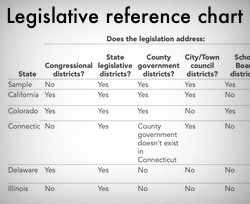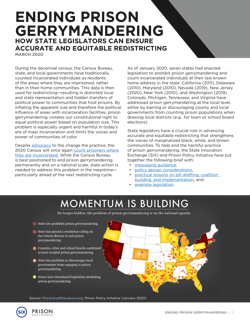New quick-reference chart summarizes legislation, prison gerrymandering reform
Our new quick-reference chart helps advocates sift through the differences between states' legislative approaches to ending various aspects of prison gerrymandering.
by Andrea Fenster, August 30, 2021
More than 10 states have now passed legislation ending prison gerrymandering. However, each state has taken a slightly different approach towards achieving that goal, creating laws that sometimes differ in substantive (though not always substantial) ways.
We have created a new quick reference chart to help advocates and legislators sift through and compare some of these differences. Our chart includes the legislative history in each state, a statutory reference, a breakdown of which levels of government the law applies to, whether the law is mandatory or permissive, the different types of institutions covered, and how unknown or out-of-state addresses are dealt with.
Of course, our model legislation offers our best guidance for those looking to end prison gerrymandering in their own states.






